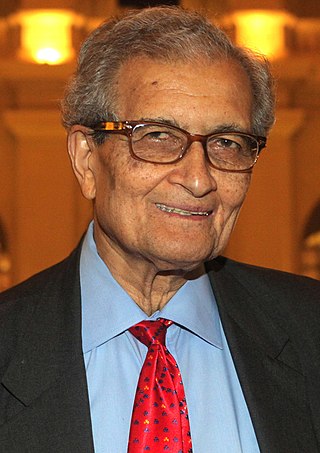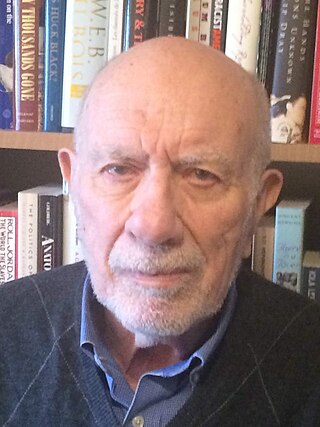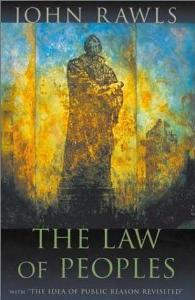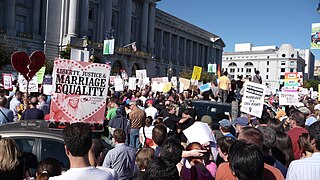
Jurisprudence is the philosophy and theory of law. It is concerned primarily with what the law is and what it ought to be. That includes questions of how persons and social relations are understood in legal terms, and of the values in and of law. Work that is counted as jurisprudence is mostly philosophical, but it includes work that also belongs to other disciplines, such as sociology, history, politics and economics.

Justice, in its broadest sense, is the concept that individuals are to be treated in a manner that is equitable and fair.
Social justice is justice in relation to a fair balance in the distribution of wealth, opportunities, and privileges within a society where individuals' rights are recognized and protected. In Western and Asian cultures, the concept of social justice has often referred to the process of ensuring that individuals fulfill their societal roles and receive their due from society. In the current movements for social justice, the emphasis has been on the breaking of barriers for social mobility, the creation of safety nets, and economic justice. Social justice assigns rights and duties in the institutions of society, which enables people to receive the basic benefits and burdens of cooperation. The relevant institutions often include taxation, social insurance, public health, public school, public services, labor law and regulation of markets, to ensure distribution of wealth, and equal opportunity.

Amartya Kumar Sen is an Indian economist and philosopher, who has taught and worked in the United Kingdom and the United States since 1972. Sen has made contributions to welfare economics, social choice theory, economic and social justice, economic theories of famines, decision theory, development economics, public health, and measures of well-being of countries.

John Bordley Rawls was an American moral, legal and political philosopher in the modern liberal tradition. Rawls has been described as one of the most influential political philosophers of the 20th century.
Distributive justice concerns the socially just allocation of resources, goods, opportunity in a society. It is concerned with how to allocate resources fairly among members of a society, taking into account factors such as wealth, income, and social status. Often contrasted with just process, which is concerned with the administration of law, distributive justice concentrates on outcomes. This subject has been given considerable attention in philosophy and the social sciences. Theorists have developed widely different conceptions of distributive justice. These have contributed to debates around the arrangement of social, political and economic institutions to promote the just distribution of benefits and burdens within a society. Most contemporary theories of distributive justice rest on the precondition of material scarcity. From that precondition arises the need for principles to resolve competing interest and claims concerning a just or at least morally preferable distribution of scarce resources.

Feminist economics is the critical study of economics and economies, with a focus on gender-aware and inclusive economic inquiry and policy analysis. Feminist economic researchers include academics, activists, policy theorists, and practitioners. Much feminist economic research focuses on topics that have been neglected in the field, such as care work, intimate partner violence, or on economic theories which could be improved through better incorporation of gendered effects and interactions, such as between paid and unpaid sectors of economies. Other feminist scholars have engaged in new forms of data collection and measurement such as the Gender Empowerment Measure (GEM), and more gender-aware theories such as the capabilities approach. Feminist economics is oriented towards the goal of "enhancing the well-being of children, women, and men in local, national, and transnational communities."

A Theory of Justice is a 1971 work of political philosophy and ethics by the philosopher John Rawls (1921–2002) in which the author attempts to provide a moral theory alternative to utilitarianism and that addresses the problem of distributive justice . The theory uses an updated form of Kantian philosophy and a variant form of conventional social contract theory. Rawls's theory of justice is fully a political theory of justice as opposed to other forms of justice discussed in other disciplines and contexts.

Equality of outcome, equality of condition, or equality of results is a political concept which is central to some political ideologies and is used in some political discourse, often in contrast to the term equality of opportunity. It describes a state in which all people have approximately the same material wealth and income, or in which the general economic conditions of everyone's lives are alike.

Transcendental idealism is a philosophical system founded by German philosopher Immanuel Kant in the 18th century. Kant's epistemological program is found throughout his Critique of Pure Reason (1781). By transcendental Kant means that his philosophical approach to knowledge transcends mere consideration of sensory evidence and requires an understanding of the mind's innate modes of processing that sensory evidence.

Robert Paul Wolff is an American political philosopher and professor emeritus at the University of Massachusetts Amherst.
Philosophy and economics studies topics such as public economics, behavioural economics, rationality, justice, history of economic thought, rational choice, the appraisal of economic outcomes, institutions and processes, the status of highly idealized economic models, the ontology of economic phenomena and the possibilities of acquiring knowledge of them.

The Law of Peoples is American philosopher John Rawls' work on international relations. First published in 1993 as a short article, in 1999 it was expanded and joined with another essay, "The Idea of Public Reason Revisited" to form a full-length book. Rawls's basic distinction in international politics is that his preferred emphasis on a society of peoples is separate from the more conventional discussion of international politics as based upon relationships between states. It is an attempt to show "how the content of a Law of Peoples might be developed out of a liberal idea of justice similar to, but more general than, the idea I call justice as fairness".

Global justice is an issue in political philosophy arising from the concern about unfairness. It is sometimes understood as a form of internationalism.
"Instrumental" and "value rationality" are terms scholars use to identify two ways individuals act in order to optimize their behavior. Instrumental rationality recognizes means that "work" efficiently to achieve ends. Value rationality recognizes ends that are "right," legitimate in themselves.

The capability approach is a normative approach to human welfare that concentrates on the actual capability of persons to achieve lives they value rather than solely having a right or freedom to do so. It was conceived in the 1980s as an alternative approach to welfare economics.

Justice as Fairness: A Restatement is a 2001 book of political philosophy by the philosopher John Rawls, published as a restatement of his 1971 classic A Theory of Justice (1971). The restatement was made largely in response to the significant number of critiques and essays written about Rawls's 1971 book on this subject. The released book was edited by Erin Kelly while Rawls was in declining health during his final years.

Social equality is a state of affairs in which all individuals within a specific society have equal rights, liberties, and status, possibly including civil rights, freedom of expression, autonomy, and equal access to certain public goods and social services.
In political philosophy, an ideal theory is a theory which specifies the optimal societal structure based on idealised assumptions and normative theory. It stems from the assumption that citizens are fully compliant to a state which enjoys favorable social conditions, which makes it unrealistic in character. Ideal theories do not offer solutions to real world problems, instead the aim of ideal theory is to provide a guide for improvements based on what society should normatively appear to be. Another interpretation of ideal theories is that they are end-state theories.
Creating Capabilities is a book, first published by economist Martha Nussbaum in 2011, which outlines a unique theory regarding the Capability approach or the Human development approach. Nussbaum draws on theories of other notable advocates of the Capability approach like Amartya Sen, but makes specific distinctions. One distinct idea she proposes is to choose a list of capabilities based on some aspects of John Rawls' concept of "central human capabilities." These ten capabilities encompass everything Nussbaum considers essential to living a life that one values. Martha Nussbaum and Amartya Sen are considered to be the main scholars of this approach, but have distinctions in their approach to capabilities. Sen disagrees with Nussbaum's list of values on the grounds that it does not fully encompass the range of capabilities one would consider to live a fulfilling life, which inherently differs by person.














